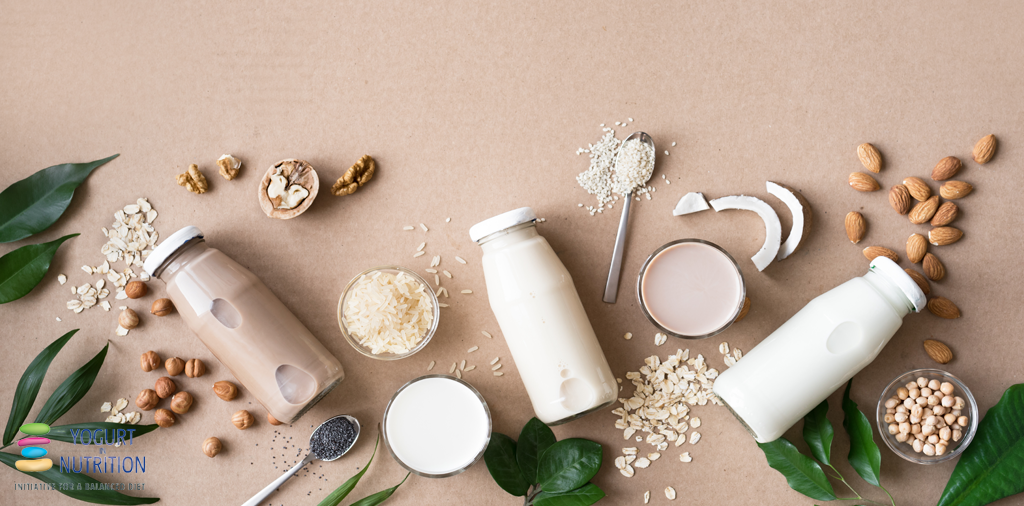You’ve only got to head to the chiller cabinets in the supermarket to see how popular plant-based dairy alternatives are becoming. Many shoppers are choosing them over dairy products because they’re concerned about the environment and animal welfare or because they think they may be healthier. So what are the facts?
In fact, it seems it’s ‘swings and roundabouts’ when it comes to the health and environmental impact of dairy products versus plant-based alternatives, say the authors of this article. On the one hand, plant-based alternatives may have the potential to help reduce our impact on the environment; on the other hand, it’s important to consider implications for our nutrition and health, say the authors.
To be sustainable, a diet should have a low environmental impact but also contribute to our food security and to healthy lives both for ourselves and our future generations. Sustainable diets support biodiversity and ecosystems, they’re culturally acceptable, accessible, affordable, and nutritionally adequate.
What’s best for the environment – plant-based or dairy?
Food production creates about a quarter of our greenhouse gas emissions (e.g. carbon dioxide, methane) that play a part in climate change, say the authors of this article. Animal products are the main contributors and are also associated with high land use, fresh-water use and water pollution. But animal farming has some positive impacts too. Grazing animals such as cows can help to preserve pastures, conserve wildlife and convert vegetation that is unsuitable for human consumption into nutritious food.
Plant-based dairy alternatives are made from soy, legumes, seeds, nuts or cereals. Their production may have fewer negative effects on the environment, scientists believe. For example, the amount of carbon dioxide released in producing milk is estimated to be 2–3 times higher than for plant-based drinks. But production of almond-based drinks uses more water than milk production.
Many more studies are needed before we can draw firm conclusions about the environmental pros and cons.
Nutrient content of plant-based versus dairy drinks
‘Dairy products currently deliver many important nutrients to large population groups and are highly appreciated.’ – Röös et al., 2018.
As plant-based drinks are often referred to as ‘milk’, it’s understandable that people may think they’re buying products that are nutritionally the same as dairy milk. But, there are important differences.
Most plant-based drinks are lower in protein and fat, but also have less carbohydrate than milk. Exceptions to this are oat drinks which contain a lot more carbohydrate, and soy drinks which contain a similar amount of protein to milk.
Dairy products are nutrient-rich and a good source of many important vitamins and minerals, including vitamin B12 and calcium. Most plant-based alternatives are fortified with vitamins and minerals, but they naturally contain more iron than milk. Soy drink is unique as it provides more riboflavin, folate, vitamin E and vitamin K than milk even when unfortified.
‘If plant-based alternatives are fortified to resemble dairy milk, they score very similarly to dairy milk in terms of the nutrient density, and the environmental advantage of plant-based alternatives will remain. However, it is unclear whether the nutrient content reached by fortification is ‘the same’ as ‘natural’ occurrence of nutrients in the diet.’ – Röös et al., 2018.
Health effects of plant-based versus dairy
Dairy consumption is associated with several health benefits, including a reduced risk of developing type 2 diabetes, improved weight control, healthy bone development, and a potential reduction in risk for several types of cancer (colorectal, bladder, stomach and breast).
Consuming soy protein is associated with reduced blood cholesterol and other improvements (eg, lower blood pressure) that may benefit heart health. Soy-based products may also be associated with a reduced risk of some cancers. But plant-based dairy alternatives haven’t been around long enough for us to know much about their long-term health effects.
So, although including plant-based alternatives in our diet as well as or instead of dairy products may hold some advantages for the environment, more research is needed in the possible implications on our nutrition and health of, the authors say.
[Plant-based alternatives] ‘could replace and complement dairy products in the human diet, potentially reducing the environmental impact of food consumption. However, […] the nutritional aspects of such a switch need to be considered.’ – Röös et al., 2018.



